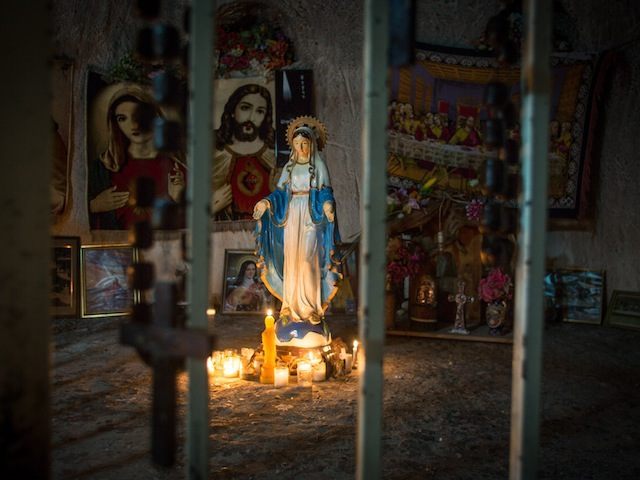ARBIL (IRAQ) (AFP) – They were threatened, forced to spit on a crucifix or convert to Islam, but a handful of Iraqi Christians miraculously survived more than two years under Islamic State group rule.
When the jihadists swept across the Nineveh Plain in northern Iraq in August 2014 and told Christians to convert, pay tax, leave or die, around 120,000 of them fled.
Ismail Matti was 14 when IS militants stormed his hometown of Bartalla, east of Mosul.
He waited for relatives who had already fled to come back for him and his sick mother, Jandar Nasi, but nobody did.
They tried to flee in taxis but were turned around twice by IS and ended up in a Mosul prison.
“There were Shiite people crammed in a cell next to ours — they took one, shot him in the head and dragged his body in front of us,” he said.
“They told my mother the same thing would happen to me if we refused to convert. So we converted,” Ismail recounted from a church-run shelter in the Kurdish capital Arbil.
The pair went back to Bartalla and were then sent to the village of Shurikhan, on the western outskirts of Mosul.
“All our neighbours were Daesh,” he said, using an Arab acronym for IS. “They would come to check if I was following the sharia (Islamic law).”
– Reign of terror –
“If they found that I hadn’t been to the mosque to pray, I sometimes got lashes,” Ismail said.
He suffered the same fate in their next temporary home in Bazwaya, east of Mosul.
Ismail would sometimes get food from friendly residents but his mother never left the house.
Jandar, who suffers from chronic migraines, was reluctant to tell their story as she sat quietly on a bed in the Arbil shelter.
Her dark, haunted gaze sometimes suddenly changed into a broad, loving smile directed at her son, as he recounted their odyssey under IS’s reign of terror.
“This boy is the most beautiful gift ever. He and God and Mary saved us from death. We will always be together,” she said.
Zarifa Bakoos Daddo stayed in Qaraqosh, once Iraq’s largest Christian town, with her sick 90-year-old husband when IS vehicles hurtled in.
“On a Wednesday, his condition worsened, we took him to hospital. On the Thursday he was dead,” said Zarifa, a 77-year-old with gnarled hands and decaying teeth.
She lived through more than two years of IS occupation of Qaraqosh in a house with her elderly friend Badriya.
“All that time I stayed with Badriya, we didn’t see any of our people, only those fellows,” Zarifa said of the IS militants.
“They would bring us food occasionally, leaving it at the door,” she said.
“The older men used to tell us not to worry, that we were like sisters to them, but the younger ones were troublesome.”
– Told to convert –
They were briefly taken to a prison in Mosul and held there with divorced women and widows, but eventually brought back to their house in Qaraqosh.
“One day, one of them came asking for money and gold. He poked his rifle into my ribs and said ‘You have to give to us’,” she said.
Zarifa handed over the $300 she had and Badriya gave some 15-carat gold.
“One time, a young one, maybe 20 or 21, came and said we should convert. I told him we had our beliefs and they had theirs,” she recalled.
“He told me to spit on a picture of the Virgin Mary and a crucifix. I refused but he made me. The whole time I was telling God in my heart that I did not mean any of this,” she said.
“I knew God heard me because he tried to burn the picture and his lighter didn’t work,” she said, to laughter from her family in their Arbil home.
When Iraqi forces pushed into Qaraqosh late last month, she remained trapped in the house with Badriya and no food.
The security forces found them several days after retaking the town.
“The whole time I prayed for my people, for the town, and also for these Daesh members, that God may open their hearts,” she said.
The illiterate widow, whose first language is a Syriac dialect, said the joy of being reunited with her relatives had already erased her suffering.
“My Arabic got better from being around them, so something came out of it, thank God.”

COMMENTS
Please let us know if you're having issues with commenting.